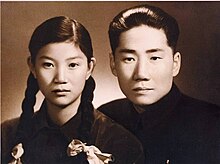Mao Anying
Mao Anying | |
|---|---|
 Mao Anying and wife Liu Songlin. | |
| Born | 24 October 1922 |
| Died | 25 November 1950 (aged 28) |
| Spouse | Liu Songlin (m. 1949–1950) |
| Parent(s) | Mao Zedong Yang Kaihui |
Mao Anying (Chinese: 毛岸英, Pinyin: Máo Ànyīng) (24 October 1922 – 25 November 1950) was the eldest son of Mao Zedong and Yang Kaihui. Educated in Moscow, he was killed in action by an air strike during the Korean War.
Early life
Mao Anying was born in an American Christian hospital in Changsha, Hunan Province. His mother, Yang Kaihui was executed by the Kuomintang in 1930. He and his younger brother, Mao Anqing, escaped to Shanghai, where they attended a kindergarten run by the Communist underground. In Shanghai, they lived with Pastor Dong Jianwu (董健吾), who was an Communist party member.[1]
In 1933, the Communists moved their headquarter to Jiangxi, care for the brothers was temporarily cut off and they lived on the streets as orphans. Their father, Mao Zedong was in the Jiangxi province at the time.
In 1936 Anying was brought to Paris by Li Du, from Paris, he was then sent to Moscow where he studied under the pseudonym Xie Liaosha (謝廖沙). He joined the Soviet Army during the Second World War and saw combat in the Eastern European theater. After the war, he returned to China in January 1946, and married Liu Songlin in October 1949.
Korean War
At the outbreak of hostilities in 1950, Mao Anying volunteered for the Chinese People's Volunteer Army. Because Mao Anying was the first son of Mao Zedong, Peng and other senior Chinese leaders were at first unwilling to allow him to fight in Korea. When Mao Zedong was asked to intervene, he refused, saying "He is, after all, the son of Mao Zedong". Mao Anying met up with the army in Shenyang on 8 October and crossed the Yalu River with General Peng Dehuai on 25 October.
Anying was stationed in the army headquarter with Peng in caves near an old gold mining settlement, which offered excellent protection from American air attacks. The evening of 24 November 1950, two P-61 Black Widows were spotted on a photo reconnaissance mission by the Chinese on the ground near the location.[2] The next day on 25 November at around noon, a South African Air Force A-26 bomber dropped four napalm bombs, one of which hit a makeshift house near the cave, killing Mao Anying and another officer who were arbitrarily cooking their lunch in violation of war-time regulations of Chinese Army.[2][3][1]
Immediately after Anying's death, General Peng Dehuai was afraid to report the incident to Mao. It was not until January 1951 that Mao got word of his son's death through premier Zhou Enlai. According to Mao's private doctor, Li Zishui, when the news finally reached Mao who was smoking a cigarette at the time, he fell into deep contemplation. Though visibly shaken, he finally said "In war, there are sacrifices."
He was buried in Pyongyang, in the Cemetery for the Heroes of the Chinese People's Volunteer's Army though some also claim that his body was later shipped to Beijing. It is believed that Peng Dehuai's fall from grace after the Great Leap Forward and further humuliation in the Cultural Revolution was due to Mao's hatred for Peng's carelessness in protecting the life of Mao Anying.
The death of Mao Anying was viewed by many Chinese people as a blessing for China[citation needed], as Mao Anying was very likely to carry on his father Mao Zedong's power and way of ruling if he survived the Korean War, and turn China into a super-size North Korea, with an Imperial-style family dynasty and absolute totalitarianism. Instead, shortly after Mao's death in 1976, China rapidly stepped away from Maoism and started the Reform and Opening-up Drive in 1978.
2009 visit
In 2009, during a state visit to North Korea, Chinese premier Wen Jiabao paid his respects at Mao Anying's grave.
References
- ^ a b Chairman Mao Zedong and General Mao Anying, Chinese Military Leaders of the Korean War
- ^ a b http://cul.sohu.com/20081023/n260204775_12.shtml
- ^ Nanchu, Xing Hang, Page 94, McFarland Press, 2003, In North Korea: an American travels through an imprisoned nation ISBN 0-7864-1691-2, ISBN 978-0-7864-1691-2
